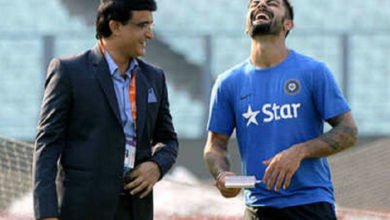CRICKETENGLISHLATEST UPDATESNEWS
Virat Kohli Credits Success of Indian Batsmen Against Pace to Throwdown Specialist Raghu

Throwdown specialist D Raghavendra’s ability to rachet up speeds in excess of 150-155 kmph with the sidearm enormously contributed to Indian batsmen’s improvement against fast bowling in recent years, acknowledges skipper Virat Kohli.
The sidearm is a cricketing equipment that is shaped like a long spoon, with its far end designed to hold and hurl the ball at great speeds.
“I believe the improvement this team has shown while playing fast bowling since 2013 has been because of Raghu,” Kohli said during an Instagram Live session with Bangladesh star Tamim Iqbal.
“He has good concepts about footwork, bat movement of players. He has improved his skills so much that from sidearm he easily hurls the balls at 155 kmph.
“After playing Raghu in nets, when you go into the match, you feel there is a lot of time,” Kohli added.
It is no surprise that Raghavendra has been a crucial member of the Indian cricket team’s support staff for years now.
Kohli said he never had self doubts at any time, including while engineering those big chases in high-pressure international matches.
“To be honest, I never doubted myself in game situations. Everyone who is human has doubts and weaknesses. Have their negatives. So in practice during tours, if you haven’t had a good session you feel you don’t have that flow.
“Yes, doubts creep in then and it’s at the back of your mind. Key is to keep going and get into that zone till you feel that it was just distraction. If I believe I am good enough, then I am good enough.”
The prolific scorer added, “Best part about match situation is that you don’t need to think so much. You react to situations knowing your role.
“Negative voices always come off the field when you are not in competition mode.”
The master of chases, Kohli said in his childhood, while watching India games, he would often go to sleep thinking that he could have helped the team to victory.
“Honestly, when I was a kid, I used to watch India games and see them lose I would go to sleep thinking I could have won that match. If I am chasing 380, I never feel that you can’t achieve it.”
“In 2011 in Hobart, we had to chase 340 in 40 overs to qualify. At the break I told (Suresh) Raina that we will approach this match as two 20 over games. 40 overs is a big duration. Let’s first play 20 and see how many runs are scored and then play another T20 game.”
Arguably one of the best batsmen to have played the game, Kohli said he had to change his approach to batting to suit his requirement, which comprised playing the ball along the ground instead of going over the top.
“I changed because I wanted to hit all around the ground. The static position was making my options limited. My basic funda of batting is that if your hips are in perfect position then you can play any shot. Static position wasn’t working well for me.
“But it works for a lot of players. Like Sachin Tendulkar had a static stance all his life and he never had a problem. His technique was far superior with excellent hand eye coordination.
“For me I had to change it accordingly to suit my needs. I tried little, little things in my batting as you would never know if you don’t try.”
Continuing, he said unless a player tries out new things in match situations, he would never be able to perfect them.
“… So my advice is even if you try a lot in practice do try out new things in one or two games to check if it works or not.
“Because if you execute it under pressure in match situations then you get a different kind of confidence. Practice prepares you but execution in match makes you confident.
“Key is to have an open mind when it comes to improvising. I hear a lot of players say this is my natural game and I play like this but if opposition figures you out, you have to improve and stay a step ahead. Learn, process information and execute.”
As far as preparation is concerned, he said the only set pattern he follows is when it comes to his diet and fitness.
“In case of batting if you are not in good form, you like to spend more time in the nets until one session which you will yourself know was a perfect net session.
“After that I don’t spend more than 10 minutes. Then I take throwdowns. Once you are in touch you shouldn’t overdo net sessions as you will create bad habits.
“Once you have a perfect net session you tend to think you can hit any shot. And in that process, the body shape goes awry and you would be frustrated. So all your work will go down the drain.”
He said it is very important for a batsman to know when to step out of a net session.
“Let me tell you, just like you know how much to train, you should also know when to get out of the nets because that’s also a skill.
“But it’s an individual thing as if you see Pujara he will bat for three hours.
“Everyone knows how to play cricket but sometimes we complicate it by thinking too much.





